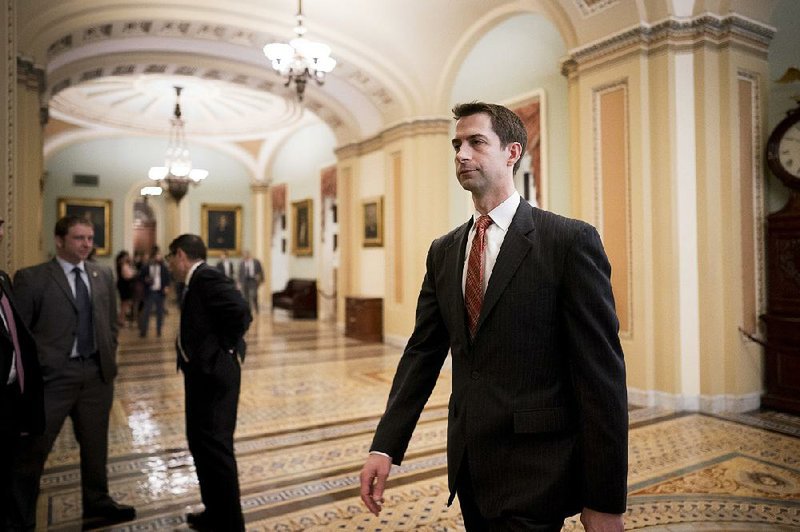WASHINGTON -- The American economy is growing, inflation is low and unemployment has fallen sharply, but millions of Americans are struggling anyway, think-tank experts and others told lawmakers recently.
Conservative and liberal witnesses alike portrayed a country where many people are failing to get ahead or have actually lost ground in recent years.
The Senate Banking Committee Subcommittee on Economic Policy held the hearing, titled, "Economic Mobility: Is the American Dream in Crisis?"
U.S. Sen. Tom Cotton, R-Ark., chaired Wednesday's meeting.
Yuval Levin, a resident scholar with the conservative American Enterprise Institute and a former White House domestic-policy staff member, said "the rising cost of living for working families" makes it hard for many families to keep up.
"That may seem a strange subject on which to raise alarm since inflation has been remarkably low for more than three decades in America," he said. "But while that's true of general inflation, household costs have actually risen dramatically in three areas of particular importance to economic mobility. We might call these the three H's: health care, housing and higher education.
"These three areas are of enormous importance to American families who are striving to improve their living standards. ... And yet in all three areas, we've seen prices run far ahead of value for decades now," he said.
Thea Mei Lee, president of the pro-union Economic Policy Institute, blamed bad government decision-making for the lack of economic mobility.
"What we're talking about here today is how policy choices over recent decades have eroded access to the American dream for too many Americans and also how we can use policy to restore opportunity and mobility for working people," she said.
"The lack of economic opportunity for low-wage and middle-class American families is not an accident of history, not a nameless economic force against which we find ourselves powerless," she said. Instead it is a "direct result of policy choices that together have had the effect of weakening the power of workers to defend their rights in the workplace and in the political arena, thereby tilting the playing field in favor of moneyed and corporate interests."
During his question time, U.S. Sen. Ben Sasse, R-Neb., noted the gaps between rich and poor that are particularly apparent in some areas, including Jackson Hole, Wyo.
"They say that almost everybody who lives in Jackson or who visits Jackson is either a three-house or a three-income person. You've got the people who live in Jackson as one of their two or three or four housing destinations in life, or you have people in the Uberization economy, to put it broadly, that are cobbling together wages from a whole bunch of different jobs," he said.
During questioning, Levin also spoke about substantial disparities.
"We have a concentration at the top and at the bottom and the median just matters less. It describes less than we would imagine. There are fewer people near the median than there might have been in the America of the middle of the 20th century," he said.
Levin, among others, stressed the importance of offering economic opportunities for those who don't pursue a traditional college education.
Cotton of Dardanelle raised concerns about declining job prospects for those with a high school education or less, asking whether there was a link between "wage declines for working-class Americans, job prospects for working-class Americans and, on the other hand, large increases in unskilled and low-skilled immigration."
Ramesh Ponnuru, a visiting fellow at the American Enterprise Institute, voiced doubts about current policy.
"I think that the level of immigration that we've had and the basis on which we've admitted the immigrants, have not been well-geared towards increasing American prosperity, and particularly at the low end of the labor market. I think there is some evidence to suggest that a large influx of low-wage labor is going to have a depressing effect at that end of the market," he said.
Shifting to a more merit-based immigration system, as Cotton has urged, would probably "have a positive effect" on the economy and on Americans trying to move up the economic ladder, he added.
SundayMonday on 07/21/2019
